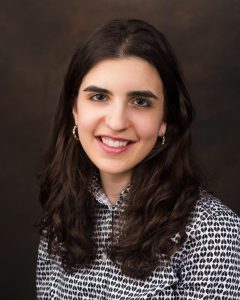B.S. in Mechanical Engineering and B.A. in Mathematics
UMBC (Expected Graduation: May 2019)
Research Interests: Wind Energy Development, Uncertainty Quantification, Artificial Intelligence/Machine Learning, Environmental Statistics, Atmospheric Modeling, Numerical Modeling, Model Validation, Remote Sensing
Meredith joined the UMBC Atmospheric Lidar Group in January 2017 to study how remote sensing technology can be used to reduce wind turbine power prediction uncertainty. Although wind power can provide a significant source of clean energy, wind power prediction uncertainty causes underperformance bias and impedes the success of many wind farms. Meredith has developed a systematic method to evaluate the wind power prediction uncertainty reduction achieved by increased rotor layer measurements and improved rotor layer characterization methods. Meredith’s research focuses on determining the role of various atmospheric conditions in wind turbine power production. The goal of this work is to develop site-specific wind power prediction models using explicit multivariate power curves or machine learning techniques. After graduating with degrees in Mechanical Engineering and Mathematics, Meredith plans to pursue a PhD.
Publications
A. St. Pé, M. Sperling, J. Brodie, R. Delgado. Classifying rotor-layer wind to reduce offshore available power uncertainty, Wind Energy, 1–13, 2018.
Presentations
M. Sperling, A. St. Pé, A. Choukulkar, C. L. Archer, R. Delgado. Evaluating Wind Power Prediction Uncertainty Using Scanning Doppler Wind Lidar. American Meteorological Society 98th Annual Meeting, Austin, Texas. January 2018.
